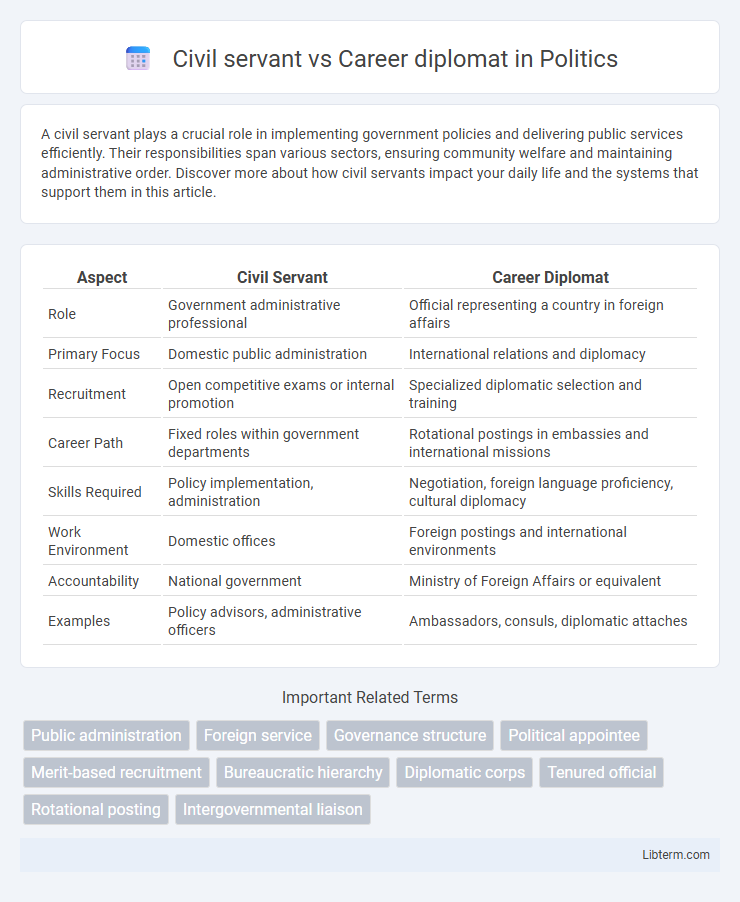A civil servant plays a crucial role in implementing government policies and delivering public services efficiently. Their responsibilities span various sectors, ensuring community welfare and maintaining administrative order. Discover more about how civil servants impact your daily life and the systems that support them in this article.
Table of Comparison
| Aspect | Civil Servant | Career Diplomat |
|---|---|---|
| Role | Government administrative professional | Official representing a country in foreign affairs |
| Primary Focus | Domestic public administration | International relations and diplomacy |
| Recruitment | Open competitive exams or internal promotion | Specialized diplomatic selection and training |
| Career Path | Fixed roles within government departments | Rotational postings in embassies and international missions |
| Skills Required | Policy implementation, administration | Negotiation, foreign language proficiency, cultural diplomacy |
| Work Environment | Domestic offices | Foreign postings and international environments |
| Accountability | National government | Ministry of Foreign Affairs or equivalent |
| Examples | Policy advisors, administrative officers | Ambassadors, consuls, diplomatic attaches |
Introduction to Civil Servants and Career Diplomats
Civil servants are government employees who perform administrative and operational tasks across various public sectors, ensuring the implementation of policies and delivery of public services. Career diplomats specialize in representing their country abroad, managing international relations, and conducting diplomatic negotiations. Both roles require specialized training and commitment to public service, but career diplomats undergo specific diplomatic training and assignments in foreign affairs.
Definitions and Key Differences
Civil servants are government employees working in various public administration roles, responsible for implementing policies across departments, while career diplomats specialize in managing international relations and representing their country abroad. Key differences include civil servants' broader domestic focus and diverse functional assignments, contrasted with career diplomats' targeted expertise in diplomacy, foreign policy, and negotiation. Career diplomats often undergo specialized training in foreign affairs and international law, distinguishing their role from the generalist nature of civil service positions.
Roles and Responsibilities
Civil servants manage domestic government functions including public policy implementation, regulatory compliance, and administrative duties, ensuring efficient operation of national agencies. Career diplomats represent their country's interests abroad by negotiating treaties, fostering international relations, and protecting citizens overseas. Both roles require strong analytical skills and adherence to government protocols, but civil servants concentrate on internal governance while diplomats focus on foreign affairs and global diplomacy.
Recruitment and Selection Processes
Civil servants typically undergo a standardized recruitment process that includes written exams, interviews, and assessment centers targeting a broad range of public administration roles, emphasizing generalist skills and government policy knowledge. Career diplomats face a more specialized selection process, often involving rigorous foreign service exams, language proficiency tests, and situational judgment assessments designed to evaluate diplomatic aptitude, international relations expertise, and cross-cultural communication abilities. Both processes prioritize meritocracy but differ significantly in their emphasis on specialized diplomatic competencies versus general civil service functions.
Training and Professional Development
Civil servants undergo comprehensive training programs focused on public administration, policy development, and government operations, often starting with foundational courses at national civil service academies. Career diplomats receive specialized education in international relations, foreign languages, and diplomacy techniques through institutions like diplomatic academies, with continuous professional development via postings abroad and seminars on global affairs. Both paths emphasize lifelong learning but differ in content, as civil servants concentrate on domestic governance while diplomats prioritize cross-cultural communication and international negotiation skills.
Career Progression and Mobility
Career diplomats experience structured career progression driven by government foreign service systems, often advancing through ranks based on diplomatic postings, language proficiency, and international experience. Civil servants typically follow broader administrative career paths with mobility centered around domestic agencies, which may limit international assignments compared to diplomats. Career diplomats benefit from frequent overseas rotations enhancing their global networks and skills, while civil servants usually have fewer international mobility opportunities, focusing more on policy implementation within national contexts.
Work Environment and Culture
Civil servants typically work within a structured government environment emphasizing stability, routine tasks, and policy implementation across various public sectors, fostering a culture of bureaucracy and adherence to regulations. Career diplomats operate in international settings, often facing dynamic, high-pressure environments that require adaptability, cultural sensitivity, and negotiation skills, promoting a culture of global engagement and protocol observance. Both roles demand professionalism, but civil servants experience more predictable work conditions, while diplomats navigate diverse cultural landscapes and rapidly changing geopolitical contexts.
Influence on Government Policy
Civil servants play a crucial role in shaping government policy through administrative expertise and implementation within various departments. Career diplomats influence policy by providing specialized knowledge on international relations and negotiating with foreign governments to align diplomatic strategies with national interests. Their combined efforts ensure coherent policy development and execution both domestically and internationally.
Challenges and Opportunities
Civil servants face challenges in job rotation and adapting to diverse bureaucratic environments, while career diplomats navigate complex international relations and geopolitical shifts. Opportunities for civil servants include steady career progression and specialization within domestic policy, whereas career diplomats gain global exposure, cross-cultural negotiation skills, and influence in shaping foreign policy. Both roles demand strong communication, adaptability, and crisis management abilities to effectively serve government objectives.
Conclusion: Choosing the Right Path
Civil servants typically focus on domestic policy implementation and public administration, while career diplomats specialize in international relations and representing national interests abroad. Choosing the right path depends on whether one prefers working within the government's internal frameworks or engaging in global diplomacy and cross-cultural negotiation. Both careers require strong communication skills, adaptability, and a commitment to public service but cater to different professional interests and career goals.
Civil servant Infographic

 libterm.com
libterm.com